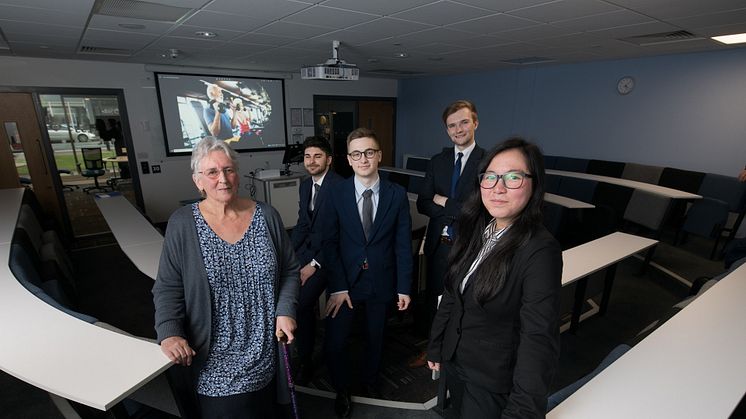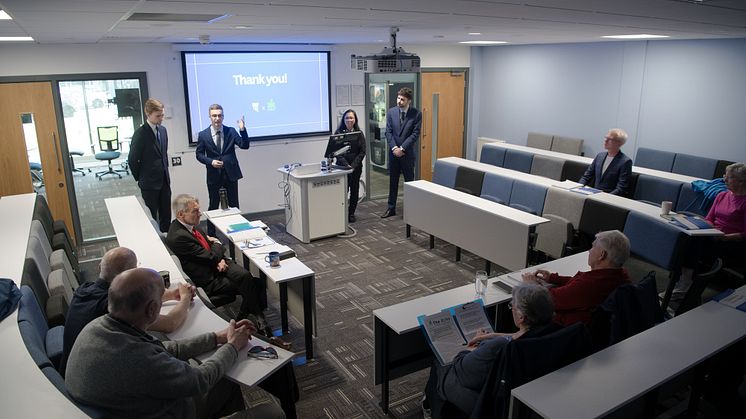
Press release -
Students support council mission to promote quality living in later life
A North East organisation that aims to help Newcastle become an age-friendly city has received support from talented university students to widen its appeal and membership base.
Elders Council, a not-for-profit membership organisation for people aged 50 and over in Newcastle, wants to promote a positive image of ageing and inspire and enable older people to be active and improve their quality of life. With around 1,300 members on its books, it is seeking to engage with more people across the city, and boost its proportion of members in the 50-65 age bracket (currently 13% of total membership).
The students, who are all from Northumbria University’s Business Clinic, were asked to increase awareness of Elders Council as it bids to recruit new members (particularly from the 50-65 age target group), strengthen relationships with ethic minority groups, and create opportunities for the organisation to forge new contacts that could help it improve and expand its service offering.
The students – Jakub Slachta, Ben Inman, Jakub Vana and Yen Hoa Tranova – conducted initial audits to thoroughly evaluate Elders Council’s operations. This was designed to identify areas where it could improve its outreach and develop new activities for its members.
They then looked at strategies to increase membership among 50-65-year-olds, identified ways to build strong relationships with ethnic minority groups, and devised a communications strategy to increase the visibility of Elders Council. The consultancy work also carefully analysed the organisation’s website.
On the back of this work, the students produced a series of recommendations that would allow Elders Council to meet the original aims of the project. These included an overhaul of the organisation’s marketing materials, ideas for increased collaboration with local organisations such as training providers, universities and Newcastle City Council, new activities for members to try including a new book club, and paid-for and organic campaigns to increase engagement on social media.
To increase engagement with ethnic minority groups, the students suggested that Elders Council partner with local charities, religious organisations and community centres to share resources and provide support. Other recommendations included a jobs board in the organisation’s magazine and bulletin to encourage more people to offer volunteering services, and a crowdfunding campaign that could raise funds to improve the council’s services.
Barbara Douglas, Executive Officer at Elders Council, says: “I’m really pleased that we engaged with the Business Clinic students on this worthwhile project. Many of the findings from their report were not that surprising to us; we’ve known for a while that we needed to improve in certain areas and the students’ work has confirmed this for us. Their fresh perspectives have helped us to question our existing way of doing things and given us an opportunity to implement change.
“We need to up our game on social media and embrace it as a huge opportunity to engage with different audiences. I also like the idea of a book club that’s focused around themes of ageing as a way of generating different conversations and debate.
“Increased engagement with local organisations is also crucial if we want to get our messages across to a wider audience. We’re going to host monthly meetings with Newcastle Council, review other existing partnerships to see if we can get more out of them, and forge new links with organisations that can help us generate real benefits to the community of people aged 50-plus in this region.”
Jakub Slachta, who previously worked as a financial analyst for a French start-up and sales intern for a Czech-based tech company, says: “Our consultancy work for Elders Council proved to be our most extensive and rewarding project during our time at the Business School. Elders Council is an excellent organisation that does some great work but we felt there were opportunities where they could further improve their service offering and increase engagement with their target audiences.
“In carrying out this work, our aim was to cement Elders’ position as a forward-thing organisation that generates tangible benefits for local people and communities. Hopefully our recommendations have given the council food for thought.”
Nigel Coates, founder of the Business Clinic at Northumbria University, says: “This project showcased the value of bringing in students from different backgrounds to achieve a common goal. Hopefully their recommendations will help Elders Council to continue its excellent work in addressing issues of importance to its members and improving the quality of life for local people.”
The Business Clinic at Northumbria University offers pro-bono consultancy support to SMEs, multi-national organisations, charitable organisations, educational trusts and social enterprises that operate across a wide range of sectors, both in the North East of England as well as further afield in the UK and overseas.
Students work at the Business Clinic within their final year of study, offering clients a full consultancy experience that takes in activities as diverse as feasibility studies including finance, investment and growth; HR including recruitment, retention and diversity; marketing including branding and digital; business analytics; logistics and supply chain. The aim of each project is to undertake research and make recommendations that will benefit the organisation in the short and long term.
Topics
Categories
UNIVERSITY OF THE YEAR 2022 (Times Higher Education Awards)
Northumbria is a research-intensive university that unlocks potential for all, changing lives regionally, nationally and internationally. Find out more about us at www.northumbria.ac.uk
--- Please contact media.communications@northumbria.ac.uk with any media enquiries or interview requests ---









